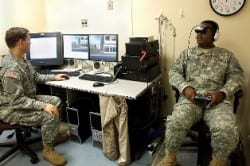Battling PTSD at the UCF RESTORES Clinic
Just reading labels on the rows of little jars seems like enough to trigger a traumatic memory: CORDITE, DIESEL FUEL, BURNING TRASH, BODY ODOR, GUNPOWDER, BURNT HAIR. And if it doesn’t, the carefully concocted scents inside — delivered to patients’ nostrils with precision fans while they “see” corresponding visuals inside high-tech headsets — almost certainly will.
But that’s exactly the idea behind this kind of exposure therapy — to deliberately return patients suffering from post-traumatic stress disorder (PTSD), via virtual reality, to the scenes and situations that haunt them. “If we do this repeatedly,” says UCF psychology professor Deborah Beidel, “say, ‘okay, take me through what happened to you,’ while the memory may remain – it’s not erased –it loses its ability to elicit anxiety and allows them to once again function in the world.”
It’s by no means an easy process though. With virtual reality headsets, audio equipment, scent machines and even a pad underfoot to simulate the vibration of explosions, Beidel and her colleagues and graduate students can recreate with almost disturbing fidelity the exact traumatic events that patients remember. On occasion, the responses have been intense enough that patients have vomited during therapy.
Still, it works, as it did for Marine First Sergeant Doug Hester, who came to UCF RESTORES — an on-campus clinic for active duty personnel and veterans who developed PTSD as a result of serving in the Iraq and/or Afghanistan conflicts – struggling with anxiety and hypervigilance and growing steadily more isolated from his former life and the people in it.
After a 17-week program of virtual reality exposure therapy to address anxiety, combined with carefully designed group therapy to address anger, social isolation and depression, Hester says he’s back to his old self. “We got in there and addressed the issue,” he says, which was exactly what he wanted to do, instead of more traditional talk therapy or medication.
In fact, that combination of intense exposure therapy with targeted group therapy works for a remarkable number of patients. At the end of the treatment – either the 17-week program Hester did or an intensive, three-week program – more than 60 percent of patients no longer meet the diagnostic criteria for PTSD.
The problem, to put it very simply, is there are too many Hesters and not enough Beidels. The $5 million Department of Defense grant that allowed Beidel to establish the clinic in 2011 only covers treatment of Iraq and Afghanistan veterans, not those from other conflicts. Nor does it allow Beidel and her colleagues to treat other groups, like first responders, who actually suffer from PTSD at a higher rate than the military. “We turn away a lot of people,” she says.
Even among the Iraq and Afghanistan veterans that UCF RESTORES is funded to treat, the clinic is hardly able to scratch the surface of the overwhelming need for care. Patients — who are referred from all over the country by Veterans Administration personnel, private clinicians and on-base psychologists — go through treatment in groups of four to six at a time, which doesn’t do much to defray the long waits — sometimes over a year — for PTSD treatment from the VA.
The only realistic answer, of course, lies in exponentially increasing the number of clinicians trained in this new kind of treatment. “A lot of clinicians are afraid to do exposure therapy with people with combat-related PTSD,” says Beidel. “They don’t know how to do it, and they believe the myths. We have data to show that even in this intensive program, people don’t increase alcohol use, don’t become more suicidal. None of those things that people think should happen, happen.”
So, alongside treating as many patients as possible, another of Beidel’s primary objectives is training as many clinicians as possible. The way she sees it, her graduate students will leave campus and establish their own practices or clinics, or join the faculty at other universities, where they’ll not only treat more patients but also train more clinicians, who in turn will train more, creating a ripple effect that has the potential to make a real difference.
Additionally, Beidel hopes to bring postdoctoral fellows, medical students, practicing clinicians and others to the clinic to train them in the same interventions. The demand is already there, she says, just not the funding, since current grants don’t cover training.
That crucial Department of Defense grant runs out in November 2015, and at the point, absent some additional funding source, Beidel and her colleagues will essentially shut the doors. They’ll continue their research, of course, and continue training graduate students, but there won’t be any more money to pay for the costs of treatment – equipment, supplies, and the licensed clinicians required to keep the doors open. “You can’t run a project with people with this level of emotional distress with graduate students,” Beidel says, “because they can’t be available for emergencies, they can’t take on the number of participants that are in need of treatment, they can’t keep a clinic open 40 hours a week, which is what we need.”
To ensure that UCF RESTORES can continue to serve patients and families, educate tomorrow’s clinicians and develop more effective treatments, the UCF College of Sciences has established an ambitious fundraising goal: creation of a $6 million endowment to provide the kind of long-term support that will transform UCF RESTORES into a nationally recognized center for the treatment and prevention of trauma- and stress-related disorders.
Although we welcome all forms of philanthropic support, gifts to build the program’s endowment will have the greatest and most enduring impact by providing much-needed financial stability.
All gifts will be handled through the UCF Foundation Inc. please look at their website here.


